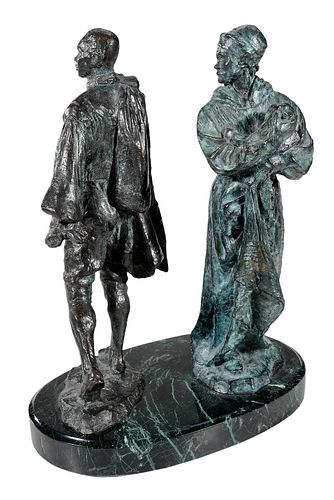Raymond Kaskey Bronze
Bid Increments
| Price | Bid Increment |
|---|---|
| $0 | $25 |
| $100 | $50 |
| $1,000 | $100 |
| $2,000 | $200 |
| $3,000 | $250 |
| $5,000 | $500 |
| $10,000 | $1,000 |
| $20,000 | $2,000 |
| $50,000 | $5,000 |
| $100,000 | $10,000 |
(Washington, D. C., born 1943)
Hercules and Oney Judge, design for commission contest, unsigned, patinated bronze in a green marble base, 11-1/2 x 9 x 6-1/2 in.
Note: Raymond Kaskey is an American architect and sculptor most well-known for his works of monumental and memorial sculpture. He studied architecture at Carnegie Mellon University and Yale University, and in 1983 established Kaskey Studio. Throughout his career as an artist, Kaskey has received numerous commissions to create public art for civic buildings and memorials across the country, including the architectural sculptures for the National World War II Memorial in Washington, D.C. and Portlandia for the Portland Public Services Building in Portland, Oregon.
Kaskey has made it a personal project to reflect on and honor black history. He entered a contest with this bronze for a commission from the House of Representatives, Philadelphia, Pennsylvania. It is a powerful depiction of two black slaves that escaped George Washington's household in Philadelphia. The female is Ona or "Oney" Judge. She became Martha Washington's personal maid as a teenager. In 1796, Ona escaped to New Hampshire, where she lived until her 1848 death. In New Hampshire, she married a free black sailor named Jack Staines and had three children, who all died before her.
"After Ona Judge escaped from Philadelphia, Washington attempted to recapture her. He found out where she was when a friend of Martha Washington's granddaughter happened to encounter Judge in Portsmouth, New Hampshire. Washington wrote to the collector of customs in Portsmouth, requesting that he apprehend Judge and send her back. The New Hampshire official, after speaking with Judge, declined to do so. Two years later, Washington asked his secretary and nephew, Burwell Bassett, Jr., to seize Judge and her child, born after her escape. Bassett confided his intentions to John Langdon, the governor of New Hampshire, while dining with him, but Langdon sent a warning to Judge. She escaped yet again and fled the town with her child. Near the end of her life, when Judge was old and had outlived all of her family, people who spoke with her were impressed by her dignity, her faith in God, and her abiding love of freedom."
The male figure is Hercules, the chief cook during Washington's stay in Philadelphia. He was celebrated for his mastery of his craft and exacting standards for kitchen workers. Accounts differ about his flight to freedom, but Hercules fled from bondage in 1797. Hercules would have been legally freed by the terms of Washington's will, but his wife and children remained in bondage as dower slaves.
"Hercules, known in the family as ?Uncle Harkness,? may have been the most privileged of the house enslaved. As their grandson recalled, Hercules maintained strict discipline in the kitchen. For state dinners, ?it was surprising the order and discipline that was observed in so bustling a scene.? Perhaps in appreciation, the President allowed Hercules to sell the leftovers from state banquets. With this income, he improved his wardrobe. He was seen in clothing made of linen ?of unexceptional whiteness and quality? with black silk breeches, waistcoat, and stockings. Donning a blue coat with a velvet collar and bright metal buttons, Hercules was known to enjoy his ?evening promenade? with a gold-headed cane in hand.
In 1791, Hercules knew that he was being sent home to avoid gaining his freedom legally through Pennsylvania?s Gradual Abolition Act. He expressed his dismay that anyone would ?think that a suspicion would be entertained of his fidelity.? Martha Washington chose to let him remain past the six-month mark to appease his feelings. Hercules remained in service, hiding what likely was his plan to escape. When Hercules' son Richmond was caught stealing at Mount Vernon in the summer of 1796, Washington took the precaution to leave Hercules in Virginia. While Washington was enjoying his birthday celebration in Philadelphia the next February, it was reported that Hercules went missing from Mount Vernon. Despite efforts to locate and recapture him, Hercules remained free."
(Source: National Park Website, President's House Site: Enslaved People in the Washington Household, https://www.nps.gov/inde/learn/historyculture/enslaved-people.htm)
Provenance: The Studio Collection of Ray Kaskey, Brentwood, Maryland
Condition
good condition, verdigris patina
Purchased items will be available for pick up or shipping from our Asheville, North Carolina auction facility within ten business days of the auction will be assessed a storage fee of $5.00 per day, per item. Purchaser agrees that packing and shipping is done at the purchaser's risk and that the purchaser will pay in advance all packing expenses, materials, carrier fees and insurance charges. At our discretion, items will either be packed by an agent such as a packaging store or Brunk Auctions. Please allow two weeks for shipping after payment is received. Shipment of large items is the responsibility of the purchaser. We are happy to provide names of carriers and shippers if a purchaser so requests. Brunk Auctions will have no liability for any loss or damage to shipped items.














